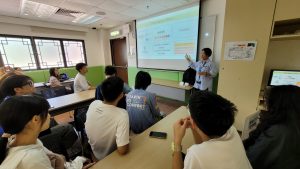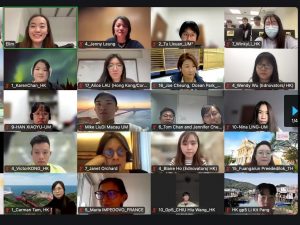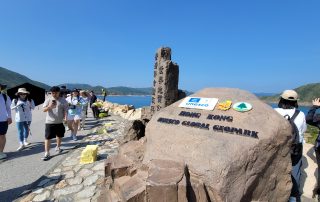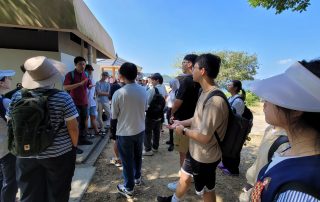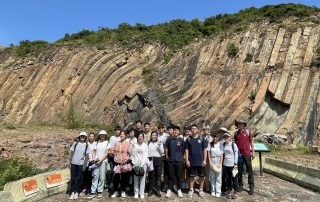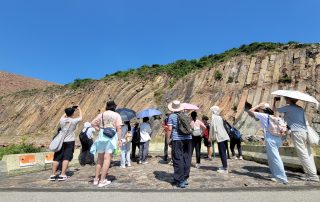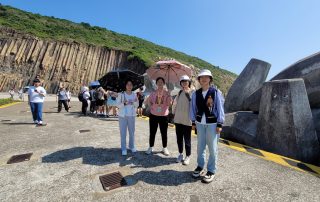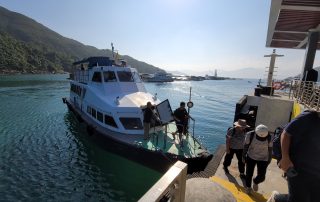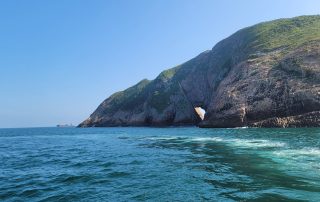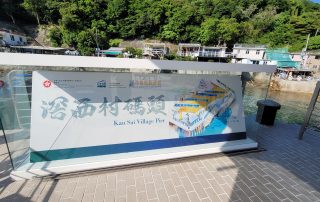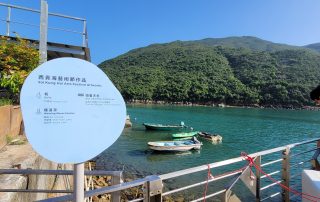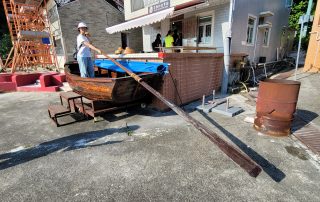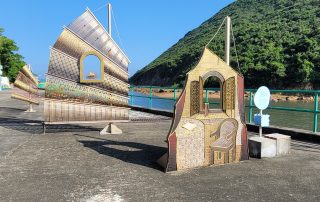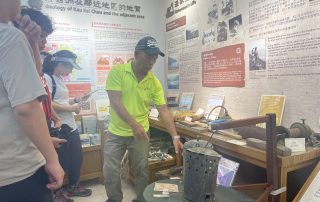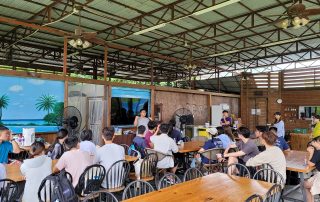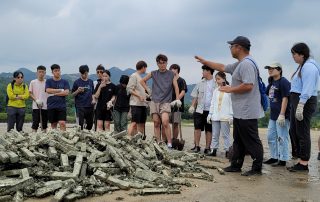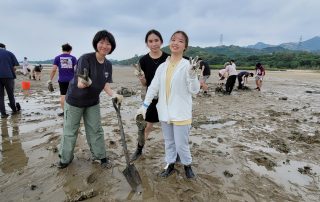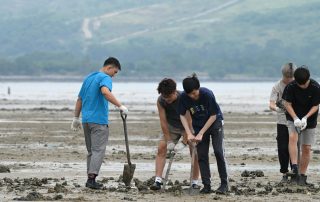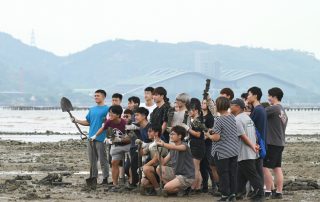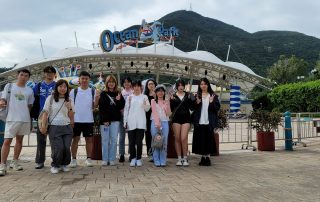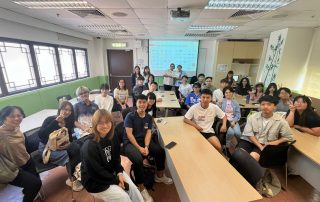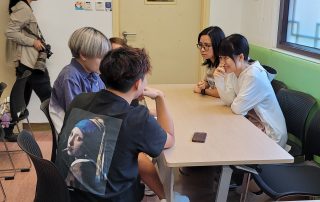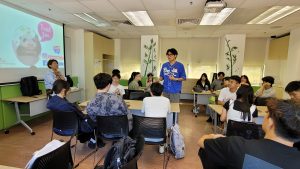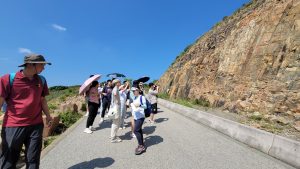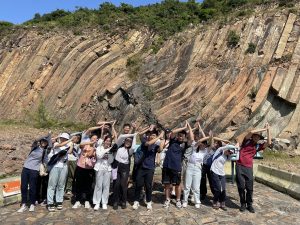
Exploring the geological wonders of Sai Kung UNESCO Global Geopark, students witnessed firsthand the preservation of natural heritage.
探索西貢聯合國教科文組織全球地質公園的地質奇觀,同學們親眼見證自然景觀遺產的保存。
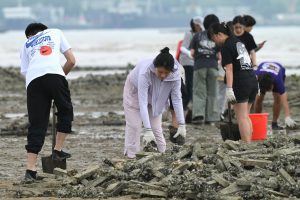
Students engaged in hands-on volunteer work in oyster restoration at Ha Pak Nai.
同學們在下白泥體驗參與蠔礁修復志願工作。
More than 30 undergraduate students from Stanley Ho East Asia College (SHEAC) at the University of Macau participated in the prestigious Global Dialogue: Sustainability in Action programme, hosted by The Chinese University of Hong Kong (CUHK) Faculty of Education from October 2024 to February 2025.
Organised as a hybrid initiative, the event series combined immersive field trips and online international discussions to deepen participants’ understanding of sustainability. The programme was carefully designed to align with the United Nations (UN) Sustainable Development Goals (SDGs), ensuring a comprehensive approach to global challenges. Students engaged with experts and peers from Hong Kong, Thailand, France and the United Kingdom, fostering dynamic cross-cultural exchange and generating actionable insights for a greener future.
Highlights of the Programme
1. Immersive Field Trips to Ecological Conservation Sites in Hong Kong
Students joined three field trips hosted by Hong Kong-based environmental organisations which provided practical knowledge for advancing sustainability initiatives within their respective scopes and communities.
- Ha Pak Nai, Yuen Long: Explored community-driven wetland conservation and biodiversity restoration in this ecologically vital area.
- Sai Kung UNESCO Global Geopark: Examined sustainable geotourism and Hong Kong’s unique geological and cultural heritage, including the active involvement of local villagers in preserving Hakka traditions through guided tours and workshops to revitalise community pride and cultural continuity.
- Hong Kong Ocean Park: Explored the Park’s transformation across various ecological sustainability aspects, including waste reduction, marine protection and renewable energy use; how diverse stakeholders are empowered in nature conservation; and the Park’s recent “Eat Local” scheme promoting locally sourced, seasonal food to reduce carbon footprints.
2. Online Forums with International Experts and University Students
After gaining perspectives on different sustainability initiatives through the field trips, SHEAC students attended three virtual forums. These mainly focused on Education for Sustainable Development (ESD), covering cross-cultural collaboration in sustainability, connecting local contexts to the UN SDGs, examining current curriculum frameworks and practices, and identifying challenges, opportunities, and needs for a brighter, greener future.
Cross-Border Exchange and Reflection
Enthusiastic SHEAC students who participated in both on-site and virtual sessions reflected that the experience deepened their understanding of sustainability challenges in the Greater Bay Area and beyond, while motivating them to take meaningful action on environmental issues.
One Year 2 participant remarked, “The Global Dialogue series opened my eyes to how interconnected our environmental efforts are—whether in Macau, Hong Kong, or overseas. For example, learning about the local villagers’ crucial role in preserving the cultural heritage — through guided tours and workshops that pass down traditional crafts and customs — showed me how community engagement is essential for sustainable heritage conservation.”
Another Year 3 student majoring in education added, “We returned with not just knowledge, but genuine inspiration. The programme’s blend of local Greater Bay Area case studies and international exchanges perfectly complements my background as a teacher-to-be, as I needed to explore more up-to-date initiatives happening across the region and the world to help me develop pedagogical plans in the near future.”
Building on the success of this programme, the college will continue to strengthen its commitment to fostering global citizenship, and sustainability education. By bridging local initiatives with international perspectives, SHEAC affirms the vital role of education in shaping a sustainable future.
書院同學們通過中大「全球對話」計劃培養跨文化可持續發展知識及能力
來自澳門大學何鴻燊東亞書院(以下簡稱“書院”)的超過30名本科生成功完成由香港中文大學教育學院於2024年10月至2025年2月主辦的「全球對話:可持續發展行動」計劃。該計劃以混合形式組織,為期五個月,結合了沉浸式實地考察及線上討論,深化參加者對可持續發展的認識。該計劃精心設計,與聯合國可持續發展目標(SDGs)保持一致,確保全面應對全球性挑戰。同學們與來自香港、泰國、法國及英國的專家、教授和大學生互動,促進跨文化交流並獲取可行的綠色未來見解。
計劃亮點
1. 沉浸式實地考察多個香港生態保育點
同學們參加了由香港保育機構主辦的三次實地考察,深入了解各自範疇及社區中的可持續發展實務知識。
- 元朗下白泥:探索以社區為本的”自下而上”的保育及生物多樣性恢復工作,該地區具有重要生態價值。
- 西貢聯合國教科文組織全球地質公園:考察可持續地質旅遊及香港獨特的地質和文化遺產,包括當地村民組織並帶領導賞和工作坊積極參與保護客家傳統,以重振社區自豪感和文化延續性。
- 海洋公園:了解公園在生態保育及學校和公眾教育中的角色及轉變;探討多方利益相關者如何被賦權參與自然保育;以及認識公園最近推出的「食本地鮮」計劃,如何推廣本地採購及季節性食物,減少碳足跡。
2. 與外地專家、大學生進行線上討論
三場線上論壇聚焦可持續發展教育(ESD),主要涵蓋跨文化合作、如何結合本地情況連結聯合國可持續發展目標(SDGs)、探討現有課程框架與實踐,以及辨識未來綠色發展的挑戰、機遇與需求。
跨地域交流及體驗反思
積極參與實地及線上活動的書院同學們反映,該體驗深化了他們對大灣區及全球可持續發展挑戰的了解,並激勵他們積極行動應對環境問題。
一位二年級同學表示:「全球對話系列讓我明白環保工作是如何緊密聯繫在一起——不論是在澳門、香港或海外。例如,透過舉辦導賞和傳統工藝的工作坊,了解當地村民在保護文化遺產方面發揮的關鍵作用,讓我看到了社區參與對於永續文化保育的重要性。」
一位主修教育的三年級同學補充道:「我們收穫的不僅是知識,還有真摯的啟發。該計劃結合本地大灣區案例和國際交流,正好契合我作為未來教師的背景,需要探究更多跨區域和全球的最新措施,以幫助我未來制定教學計劃。」
基於此次活動的成功,何鴻燊東亞書院將繼續加強培養全球公民意識和可持續發展教育的計劃,透過連結本地與國際視野,確認教育在推動可持續未來中扮演關鍵角色。
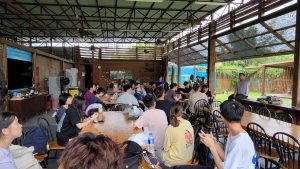
Students listened attentively to The Nature Conservancy’s presentation on its conservation efforts in Hong Kong and the Asia-Pacific region, highlighting habitat restoration and biodiversity protection.
同學們專注聆聽自然之友介紹其在香港及亞太地區的保育工作,著重棲息地修復與生物多樣性保護。
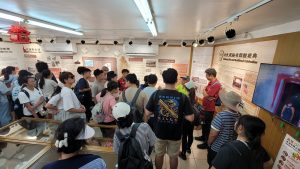
Local villagers shared about traditional Hakka crafts and customs at Sai Kung, inspiring students with a living example of cultural sustainability.
西貢村民展示客家傳統工藝與習俗,以活生生的文化可持續性例子激勵同學們。

